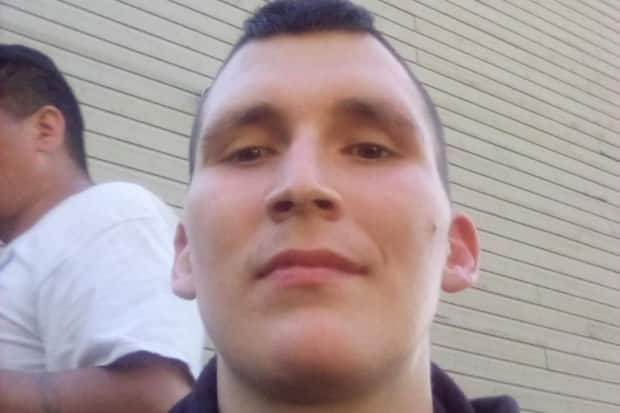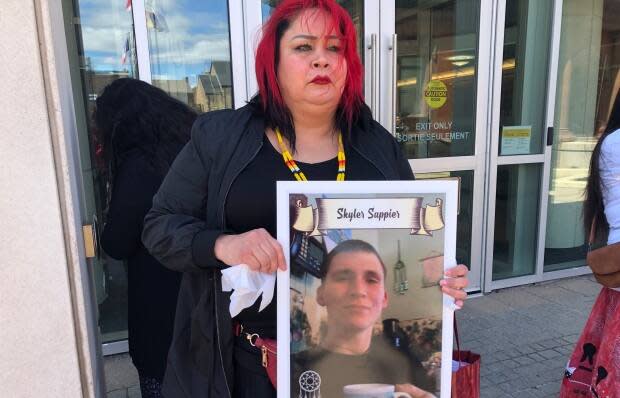'Nothing natural about that': family of inmate who died of Covid-19 disappointed by inquest

Skyler Sappier's family say they are disappointed after a coroner's jury examining the circumstances of the young man's death did not adopt more of their suggestions.
Sappier's sister, Sierra, said she's not sure the process was worth it.
"I want to say yes, but deep down, I don't think it was," she said.
"The most that we got out of it was we found out more information on what actually happened at the hospital and what led up to him going to the hospital."

Skyler Sappier, 28, died on Jan. 31, 2022, after getting sick at the Saint John Regional Correctional Centre and testing positive for Covid-19.
Coroners and juries can classify a death as a homicide, suicide, accident, natural causes or cause undetermined. The jury determined that Sappier died of natural causes — something that clearly upset his mother Dora.
She stood up and left the courtroom, returning a short time later to stand at the back.
At one point she said, "Nothing natural about that."
As the proceedings came to an end, a female voice from the back of the courtroom said loudly, "This isn't over."
Outside the courthouse later, Sierra Sappier said the family is considering "a civil lawsuit because we just feel so robbed."
A five-member jury was asked to come up with recommendations that could help prevent deaths under similar circumstances.

After hearing two days of testimony earlier this week, the jury came up with 21 recommendations on Thursday afternoon.
They suggested more resources, better record keeping and policies governing when and how to seek hospital care for inmates.
After the inquest ended, Sierra Sappier said the family is also disappointed that some of their suggestions weren't even read out in court, having been rejected as being outside the scope of an inquest.
Their list of recommendations included that the jail develop better policies and procedures about when the jail should call an ambulance and when to seek hospital care. They also called for more resources at the jail and better training for nurses.
"We would like to have a nurse or doctor on call checking in with the inmates and actually opening up the cell door, going in, doing a very verbal check and a physical check as well," she said.
"If every recommendation is followed, I believe that change can happen," said Sierra,"but if they pick and choose out of the recommendations, it's not going to be something that makes a big impact."
Presiding coroner Michael Johnston said the coroner's office is now responsible for bringing the recommendations to the attention of the agencies who have the power to act upon them.

In a statement emailed Thursday evening, Chief Ross Perley revealed "critical shortcomings within the Saint John Regional Correctional Centre that contributed to [Sappier's] tragic death."
"There was a shocking contrast between the compassionate, caring testimony provided by hospital staff and the level of ambivalence displayed by correctional staff in this incident," said Perley.
"I have no faith, after sitting through this inquest, that other Indigenous people will not face the same risk to their life in provincial correctional facilities," he said.
"As a result of this inquest, I am left with one demand — the calling of an Indigenous-led inquiry into the systemic racism that is on full display in today's justice system. We need immediate action before more people die.''
The jury's recommendations
The jury called for better resources at the jail, including equipment that would help medical staff be able to complete basic blood work on site.
They also suggested looking at the idea of adding a paramedic to the jail's staff and that better records be kept on what medical interventions are used, including when painkillers are given and when inmates first make medical complaints, and when they see the nurse.

They said better records should be kept for contact information for inmates' next of kin.
They said anyone placed in the medical unit should be checked every 15 minutes and specifically asked how they're doing, rather than just a visual check, and any changes be immediately reported to the medical staff.
What the inquest heard
The jury heard that Sappier had been ill for a few days before he was hospitalized on Jan. 29, 2022. He was double vaccinated, but had been bunked with a COVID-positive cellmate during an outbreak at the Saint John Regional Correctional Centre because of chronic overcrowding.
There was no mask mandate and within a week, 64 of 137 inmates were infected, along with 59 of 117 staff. At the peak of the outbreak, 80 inmates tested positive.
Sappier first reported feeling unwell to jail staff on Jan. 28 and he continued feeling unwell on Jan. 29. He saw a nurse that morning. All his vitals were fine and he still hadn't tested positive for COVID.
Arrangements were made to transfer him to the Saint John Regional Hospital and his positive COVID test result came back shortly before he left at nearly 5 p.m.
At the hospital, he was triaged as a Level 2, which means he should be seen by a doctor within 15 minutes of arrival. Only Level 1 is more serious and is applied when someone isn't breathing or their heart has stopped.
Sappier was showing signs of sepsis, the body's extreme response to an infection, according to an ER nurse who testified on Wednesday. He was so short of breath he was having some difficulty speaking and his heart rate was elevated.
Just before 9 p.m., he was intubated.
Sappier's condition continued to deteriorate and he died in the intensive care unit on Jan. 31, at 3:10 a.m. — nine days before he was scheduled to be released from jail.


